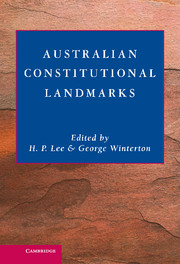Book contents
- Frontmatter
- Contents
- List of Cases
- List of Commonwealth Constitution Provisions
- List of Statutes
- List of Contributors
- Preface
- Introduction: The Commonwealth's Constitutional Century
- 1 The Emergence of the Commonwealth Constitution
- 2 The Engineers Case
- 3 The Uniform Income Tax Cases
- 4 The Bank Nationalisation Cases: The Defeat of Labor's Most Controversial Economic Initiative
- 5 The Communist Party Case
- 6 Fitzpatrick and Browne: Imprisonment by a House of Parliament
- 7 The Boilermakers Case
- 8 The Race Power: A Constitutional Chimera
- 9 The Double Dissolution Cases
- 10 1975: The Dismissal of the Whitlam Government
- 11 The Tasmanian Dam Case
- 12 The Murphy Affair in Retrospect
- 13 The Privy Council and the Constitution
- 14 Cole v Whitfield: ‘Absolutely Free’ Trade?
- 15 The ‘Labour Relations Power’ in the Constitution and Public Sector Employees
- 16 The Implied Freedom of Political Communication
- Index
5 - The Communist Party Case
Published online by Cambridge University Press: 07 October 2011
- Frontmatter
- Contents
- List of Cases
- List of Commonwealth Constitution Provisions
- List of Statutes
- List of Contributors
- Preface
- Introduction: The Commonwealth's Constitutional Century
- 1 The Emergence of the Commonwealth Constitution
- 2 The Engineers Case
- 3 The Uniform Income Tax Cases
- 4 The Bank Nationalisation Cases: The Defeat of Labor's Most Controversial Economic Initiative
- 5 The Communist Party Case
- 6 Fitzpatrick and Browne: Imprisonment by a House of Parliament
- 7 The Boilermakers Case
- 8 The Race Power: A Constitutional Chimera
- 9 The Double Dissolution Cases
- 10 1975: The Dismissal of the Whitlam Government
- 11 The Tasmanian Dam Case
- 12 The Murphy Affair in Retrospect
- 13 The Privy Council and the Constitution
- 14 Cole v Whitfield: ‘Absolutely Free’ Trade?
- 15 The ‘Labour Relations Power’ in the Constitution and Public Sector Employees
- 16 The Implied Freedom of Political Communication
- Index
Summary
Australian constitutionalism scored one of its greatest triumphs when the High Court invalidated the Communist Party Dissolution Act 1950 (Cth). That Act was designed to ban the Communist Party and affiliated bodies, and to restrict the civil liberties of persons declared by the Government to be dangerous or potentially dangerous communists. In other words, it potentially restricted the civil liberties of everyone. The High Court's decision, a celebrated victory for the rule of law, was followed by the defeat – remarkable at a time of anti-communist hysteria fanned by the Korean War – of a referendum to amend the Constitution to achieve the Government's objectives. Yet while a referendum defeat has lasting impact only in a negative sense, the Communist Party case lives on, and is as important a declaration of fundamental principles today as it was in 1951. As with all great constitutional decisions, the Communist Party case can only be understood in its historical and political context.
Before the ban
Robert Menzies' epochal general election victory of 10 December 1949 brought to office a Liberal-Country Party government committed to dissolving the Australian Communist Party.
This was not the first time a Menzies-led government had sought to ban the communists. Outlawing the Party had long been debated by the conservative parties, and unsuccessful measures had been taken against communists by the Lyons Government, in which John Latham was Attorney-General. But the Party had survived, assisted no doubt by the hardship of the Depression and the rise of fascism.
- Type
- Chapter
- Information
- Australian Constitutional Landmarks , pp. 108 - 144Publisher: Cambridge University PressPrint publication year: 2003
- 4
- Cited by



